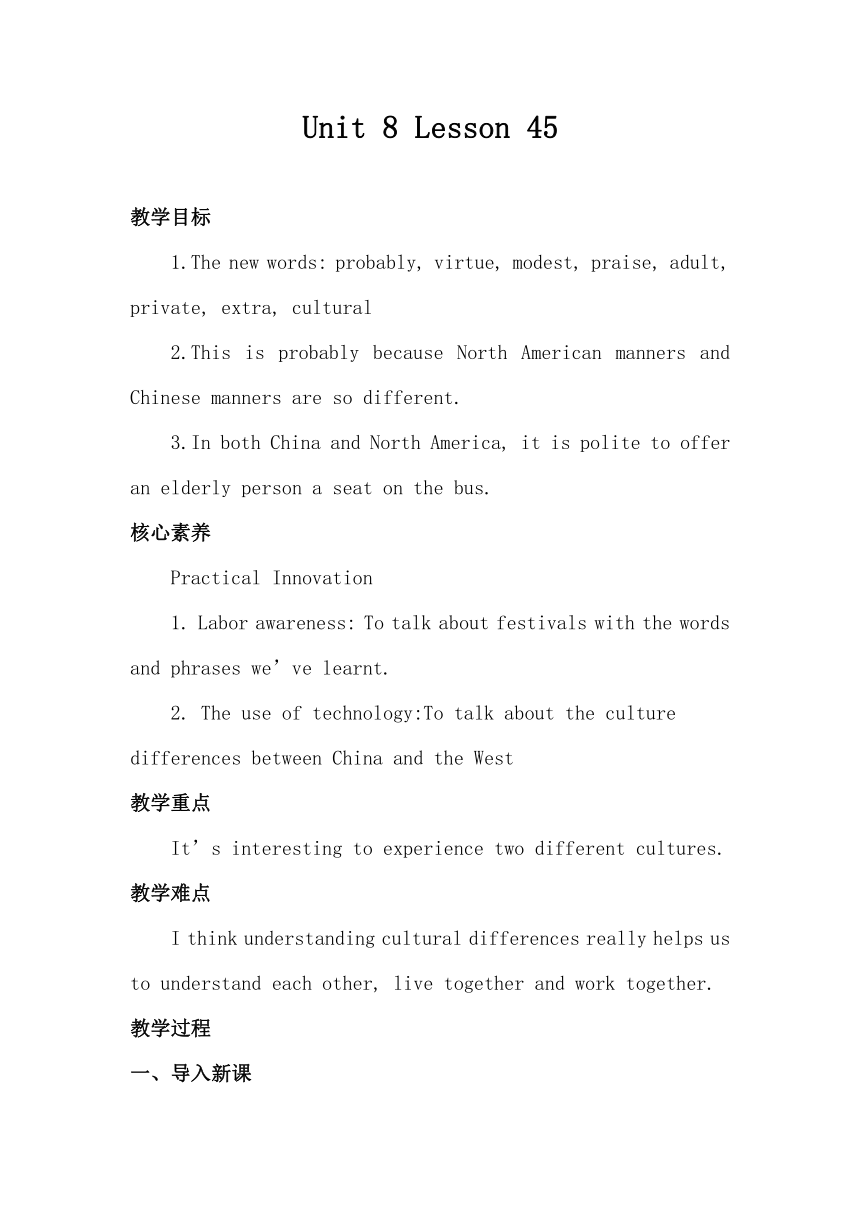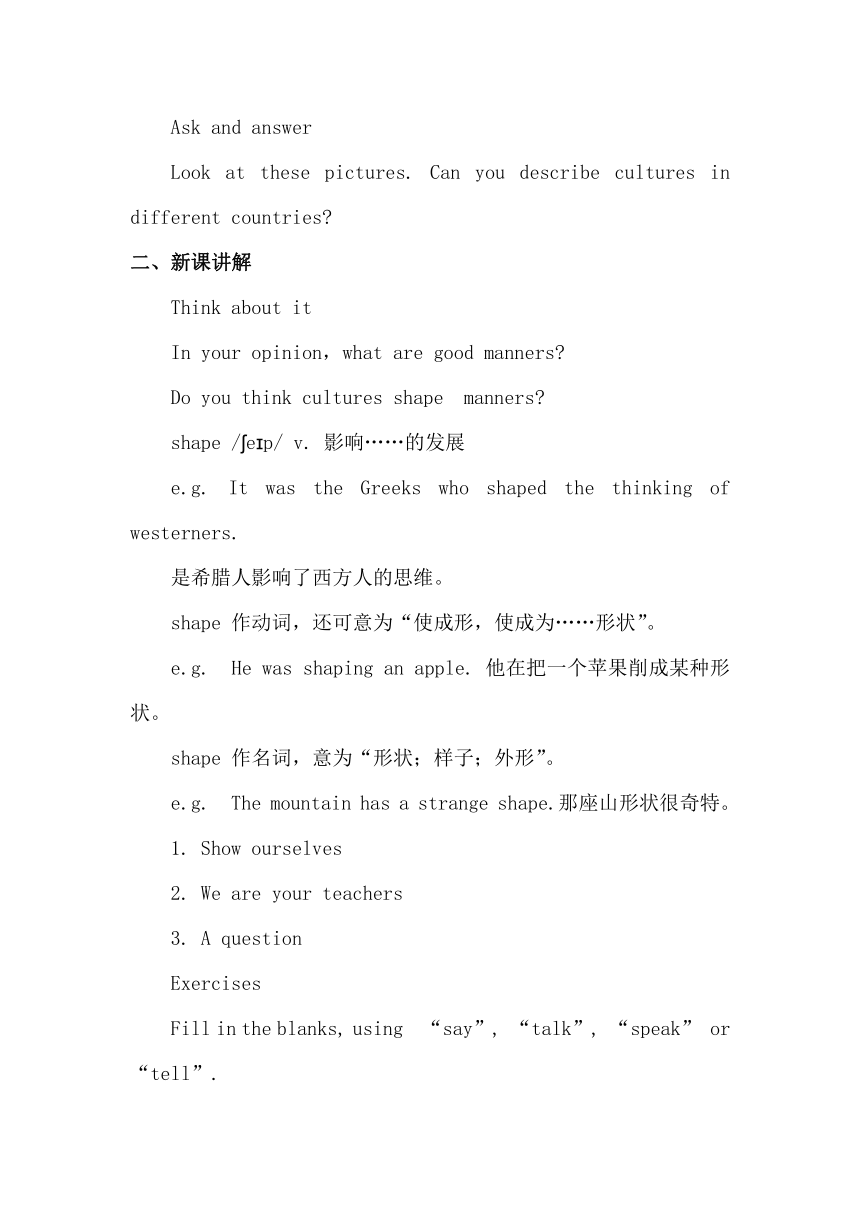冀教版九年级下册Unit 8 Culture Shapes Us Lesson 45 教案
文档属性
| 名称 | 冀教版九年级下册Unit 8 Culture Shapes Us Lesson 45 教案 |

|
|
| 格式 | docx | ||
| 文件大小 | 18.4KB | ||
| 资源类型 | 教案 | ||
| 版本资源 | 冀教版 | ||
| 科目 | 英语 | ||
| 更新时间 | 2024-02-13 00:00:00 | ||
图片预览


文档简介
Unit 8 Lesson 45
教学目标
1.The new words: probably, virtue, modest, praise, adult, private, extra, cultural
2.This is probably because North American manners and Chinese manners are so different.
3.In both China and North America, it is polite to offer an elderly person a seat on the bus.
核心素养
Practical Innovation
1. Labor awareness: To talk about festivals with the words and phrases we’ve learnt.
2. The use of technology:To talk about the culture differences between China and the West
教学重点
It’s interesting to experience two different cultures.
教学难点
I think understanding cultural differences really helps us to understand each other, live together and work together.
教学过程
一、导入新课
Ask and answer
Look at these pictures. Can you describe cultures in different countries
二、新课讲解
Think about it
In your opinion,what are good manners
Do you think cultures shape manners
shape / e p/ v. 影响……的发展
e.g. It was the Greeks who shaped the thinking of westerners.
是希腊人影响了西方人的思维。
shape 作动词,还可意为“使成形,使成为……形状”。
e.g. He was shaping an apple. 他在把一个苹果削成某种形状。
shape 作名词,意为“形状;样子;外形”。
e.g. The mountain has a strange shape.那座山形状很奇特。
1. Show ourselves
2. We are your teachers
3. A question
Exercises
Fill in the blanks, using “say”, “talk”, “speak” or “tell”.
1. We are English, we speak English.
2. Grandpa likes to tell funny stories to us.
3. Would you like to talk with me about my study
4. Mother tells me to study hard.
5. “I’m fine.”says Li Lei.
New Words
All of us need praise.
praise作名词的用法:
praise表示对人或事物的“称赞;赞扬”时,通常为不可数名词;也可用praises的形式,但较少见。
He won praise for his modesty.
in praise of 赞美
She wrote poems in praise of freedom.
The teacher praised her for her courage.
praise作动词的用法:
praise+n./pron.称赞……
They have been praising you all the time.
praise sb. for sth.因某事赞扬某人
He praised her for her courage.
Which type of school is our school, private school or public school
private 作形容词,意为“私有的、民营的、个人的”。
Her brother works in a private company.
privately是副词形式,意为“个人地、私自地”,在句中作状语。
May I have a chat with you privately
我可以私下跟你谈谈吗
Reading tasks
What are the differences between them in the passage
In China In North America
Being modest is a virtue. This is usually a sign of being weak and not confident.
It’s common in many place to ask an adult’s age. It’s not polite to ask an adult’s age.
It’s polite to offer an elderly person a seat on the bus. However, an elderly person may feel embarrassed about being offered a seat.
Chinese people take turns paying for the meal when they eat out. People often share the cost of a meal.
If the guests have no food on their plates, it’s polite to put food on their plates . If the guests have no food on their plates, the host passes food to guests .
People seldom give extra money to waiters, waitresses, taxi drivers or hotel workers . It’s always done .
Good manners or not
It is good manners to answer questions actively.
It is bad manners to sleep in class.
A tidy classsroom
Keeping our classroom tidy and clean is good manners.
Jumping over the fence is bad manners. And it’s very dangerous.
Table manners for children
Wash your hands before sitting down.
Leave toys, books and pets behind.
Sit up straight and don't slough.
Wait until everyone is seated.
Ask others to pass the dishes. Never reach across the table.
Never talk with your mouth full of food.
Use utensil quietly. Don't bang them on the table or plate.
Never take food from other people's plates.
Say "Excuse me"when leaving the table.
Remember, good manners are important and make meals more
三、作业
1. Make a project about different manners in one of the countries you’d like to travel to.
2.Preview Unit 8-Lesson 46.
教学目标
1.The new words: probably, virtue, modest, praise, adult, private, extra, cultural
2.This is probably because North American manners and Chinese manners are so different.
3.In both China and North America, it is polite to offer an elderly person a seat on the bus.
核心素养
Practical Innovation
1. Labor awareness: To talk about festivals with the words and phrases we’ve learnt.
2. The use of technology:To talk about the culture differences between China and the West
教学重点
It’s interesting to experience two different cultures.
教学难点
I think understanding cultural differences really helps us to understand each other, live together and work together.
教学过程
一、导入新课
Ask and answer
Look at these pictures. Can you describe cultures in different countries
二、新课讲解
Think about it
In your opinion,what are good manners
Do you think cultures shape manners
shape / e p/ v. 影响……的发展
e.g. It was the Greeks who shaped the thinking of westerners.
是希腊人影响了西方人的思维。
shape 作动词,还可意为“使成形,使成为……形状”。
e.g. He was shaping an apple. 他在把一个苹果削成某种形状。
shape 作名词,意为“形状;样子;外形”。
e.g. The mountain has a strange shape.那座山形状很奇特。
1. Show ourselves
2. We are your teachers
3. A question
Exercises
Fill in the blanks, using “say”, “talk”, “speak” or “tell”.
1. We are English, we speak English.
2. Grandpa likes to tell funny stories to us.
3. Would you like to talk with me about my study
4. Mother tells me to study hard.
5. “I’m fine.”says Li Lei.
New Words
All of us need praise.
praise作名词的用法:
praise表示对人或事物的“称赞;赞扬”时,通常为不可数名词;也可用praises的形式,但较少见。
He won praise for his modesty.
in praise of 赞美
She wrote poems in praise of freedom.
The teacher praised her for her courage.
praise作动词的用法:
praise+n./pron.称赞……
They have been praising you all the time.
praise sb. for sth.因某事赞扬某人
He praised her for her courage.
Which type of school is our school, private school or public school
private 作形容词,意为“私有的、民营的、个人的”。
Her brother works in a private company.
privately是副词形式,意为“个人地、私自地”,在句中作状语。
May I have a chat with you privately
我可以私下跟你谈谈吗
Reading tasks
What are the differences between them in the passage
In China In North America
Being modest is a virtue. This is usually a sign of being weak and not confident.
It’s common in many place to ask an adult’s age. It’s not polite to ask an adult’s age.
It’s polite to offer an elderly person a seat on the bus. However, an elderly person may feel embarrassed about being offered a seat.
Chinese people take turns paying for the meal when they eat out. People often share the cost of a meal.
If the guests have no food on their plates, it’s polite to put food on their plates . If the guests have no food on their plates, the host passes food to guests .
People seldom give extra money to waiters, waitresses, taxi drivers or hotel workers . It’s always done .
Good manners or not
It is good manners to answer questions actively.
It is bad manners to sleep in class.
A tidy classsroom
Keeping our classroom tidy and clean is good manners.
Jumping over the fence is bad manners. And it’s very dangerous.
Table manners for children
Wash your hands before sitting down.
Leave toys, books and pets behind.
Sit up straight and don't slough.
Wait until everyone is seated.
Ask others to pass the dishes. Never reach across the table.
Never talk with your mouth full of food.
Use utensil quietly. Don't bang them on the table or plate.
Never take food from other people's plates.
Say "Excuse me"when leaving the table.
Remember, good manners are important and make meals more
三、作业
1. Make a project about different manners in one of the countries you’d like to travel to.
2.Preview Unit 8-Lesson 46.
同课章节目录
- Unit 7 Work for Peace
- Lesson 37 Don't Fight!
- Lesson 38 Making School a Better Place
- Lesson 39 The Dove and the Olive Branch
- Lesson 40 The UN—Power of Words
- Lesson 41 Jenny's Good Advice
- Lesson 42 Peace at Last
- Unit Review
- Unit 8 Culture Shapes Us
- Lesson 43 A Visit to Chinatown
- Lesson 44 Popular Sayings
- Lesson 45 Different Manners
- Lesson 46 Home to Many Cultures
- Lesson 47 Good Manners
- Lesson 48 Supper with the Bradshaws
- Unit Review
- Unit 9 Communication
- Lesson 49 Get Along with Others
- Lesson 50 Tips for Good Communication
- Lesson 51 What Could Be Wrong?
- Lesson 52 The Power of a Smile
- Lesson 53 Working in Groups
- Lesson 54 How Embarrassing!
- Unit Review
- Unit 10 Get Ready for the Future
- Lesson 55 Look into the Future
- Lesson 56 Manage Your Time
- Lesson 57 Best Wishes
- Lesson 58 Ms.Liu's Speech
- Lesson 59 Keep Your Choices Open
- Lesson 60 Get a Good Education
- Unit Review
